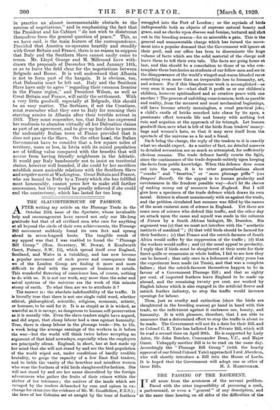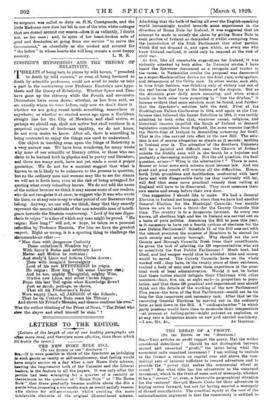THE PASSING OF THE BASEMENT.
IT all arose from the acuteness of the servant problem. Faced with the utter impossibility of procuring a cook, a parlourmaid, or even a " general " of any description, and at the same time hearing on all sides of the difficulties of the
housing question among the working class, we fell upon the plan of advertising our basement to be let to a couple, rent free, with coals and 'light, and a modest wage, in return for the woman's services as cook-general.
It was thus that the ex-sergeant bobbed up, as it were, like a lifebuoy, and our drowning fingers clutched upon him and were drawn to security out of a sea of difficulty. He was a Scotsman, and had returned to his native city in the hope of finding work there after twenty-one years' service in the Royal Marines. In this capacity he had visited every quarter of the globe, and had taken a goodly share in the hottest scraps in the Great War : torpedoed in the ' Majestic ' at the Dardanelles ; Heligoland ; Jutland ; Zeebrugge. The glory of such incidents seemed positively to shine on his manly countenance, while the sheaf of excellent official certificates of character he presented for my inspection only corroborated the "full assurance given by looks."
He was perfectly satisfied, he told me (before he had even viewed the premises from within), and ardently desired to become our tenant. His wife, an Irishwoman he had " picked up in Waterford," had been in good domestic service before her marriage, and cooked well—" baked pastry lovely." She was anxious to take the place, as they could not find a house.
But he eyed me with keen anxiety—they had two children, a boy and girl, aged seven and four. Was that a fatal obstacle ? A moment of silent tension followed while I considered the matter. Such an encumbrance was, I knew, generally looked upon as thoroughly undesirable in a prospective tenant. But then, I reasoned, our basement was solid, stone-built, and roomy, and separated from the rest of the house by a stout oaken door.
Moreover, my mother was " hard o' hearing " ; while to my own ears the shrill treble of childish voices and the patter, or perhaps clatter, of little feet are rather pleasurable than otherwise. No, I decided, the children would be no obstacle to their tenancy. He heaved a sigh of relief, and delight beamed upon his rubicund face. So the matter was promptly settled, and The Basement arrived—household goods and gear, bicycles, gramophone, and children complete—like a burst of sunshine on a grey day.
We felt that something had come into the house. There had, of course ; a whole family indeed ; but it was not that.
We were fortunate enough in having secured the services of a cook-general, it is true (a most desirable and enviable possession these days), but then we had had cooks of all kinds before ; it was not that. It was something intangible and undefinable ; an infectious spirit of gaiety, of kindness, of content, a " game- ness " that could face all things with a smile and a laugh. A subtle sweetness of life pervaded the air. It emanated from below stairs."
I think it must have been a little Irish Madonna escaped from her church's altar in the guise of a servant-girl that the Royal Marine had " picked up in Waterford " to be his wife.
Such a passion of maternity was hers, such pretty wifely devotion, such willing, kindly service, such a breadth of sympathy, good feeling and high principle, and, , most blessed and beautiful of all, invariable good humour—attributes, surely, of the Queen of Heaven !
Life became a series of amusements and lively sensations, of eloquent expressions and expressive adjectives delivered in a delicious Irish brogue, though it all flowed on evenly through
the daily routine of cooking and scouring and dusting and sweeping that is found so dull and monotonous by the modern young woman. To our little Madonna it was all a delight, from the taking of hot water to " the missis " at 7.30 a.m. to the washing up of the dinner dishes at 7.30 p.m., when she generally held me rooted to the pantry, not as an aide, but an audience, while she retailed, in her own inimitable fashion, the family history of herself and her husband, their courtship and marriage, with sidelights on former suitors, as well as picturesque details of her life on the Coastguard Stations in Ireland where she had been brought up, or the various " places " she had been in before her marriage, acting, it seemed, in all and any capacity after the happy-go-lucky fashion of the Irish—nurse, dairymaid, cook, henwife, parlourmaid, or general prop and stay of the household. " Ah, Miss, it's good to be in service ! Those were happy times. Everything provided, and nothing to worry about." Then would follow the difficulties of her ten years of married life : the small pay and ever-increasing cost of living ; the long absences of her husband on service ; the birth and death of children ; illnesses ; the anxiety and hard-
ships of the war when she had stood in " qu-ies " (queues) waiting for hours in all weathers for the necessaries of life,
or had carried coal home on her own back when ill able, and
had sewn sailors' jumpers for the Admiralty for fourteen hours out of the twenty-four that she might earn five-and-twenty extra shillings a week for her children's sake. Brave little woman !
Yet with all the hard times, her outlook on life was joyous and undimmed. Her laugh rang as merrily as her children's and was as irrepressible. The old stifled atmosphere between employer and employed suffered a change. She would eagerly follow the conversation while waiting at table, frequently joining in, or bursting into merry peals of laughter when any witticism was passed. Such behaviour was, no doubt, repre- hensible; but how could we frown on such unfeigned appreciation of our table-talk and Scottish humour ? Was not the sight of her wild-rose face dimpling with merriment, and the shining mirth in her dewy eyes, worth more than all the hidebound rules of flunkeydom ? How could one be surly when one lived in an atmosphere of unclouded sunshine from morning until evening ? When at 7.30 a.m. one's conventional banality of : " How are you this morning ? " met with the enthusiastic response : " Oh, lovely, just lovely, thank you, Miss " and when her " shining morning face " beamed down upon one's newly awakened senses, did it not make the day seem worth rising to ? While a polite inquiry of : " How are the children to-day ? " would bring forth an eloquent reply, such as : " Noble, Ma'am, noble ! " that conferred upon one a pleasurable feeling of distinction.
" We don't know ourselves for comfort here, Miss, we don't," was her constant refrain. " Never have I been so happy in mi loife. The serving of ye's a pleasure, it is, and Daddy he says the same." Could anything be more pleasing in the ears of a mistress from the lips of her handmaid ? We might with truth have returned the compliments. Never before had we revelled in such a plentiful supply of hot water at all hours, or such bakings of cakes and pastry—but not, let it be noted, at the expense of coal. Our coals lasted long over the appointed period. It was all a matter of " flues." These were the ex-sergeant's own peculiar joy and pride. If we could have seen inside, I believe we should have found them as brightly burnished as his former charges—the guns. As for the old scullery woodwork, it became white as the upper deck. " There's nothing ho wouldn't do for ye ladies, Miss," explained the Madonna graciously when I praised his handiwork, " cos ye likes the children."
Her toil for her children was as ungrudging as her service to us. What washing and ironing, what patching and darning and cutting and contriving went on ! Even on Sunday morning she would appear flushed and bright-eyed after " doing-up" muslin and duck in which Seven-years and Four-years were arrayed for Mass at the Cathedral. " I'm sure the dear Lord never said I mustn't iron on Sunday for my children," she remarked tentatively, trying to discover whether I were shocked or no. Then : " I'm glad ye think like me, Miss," when I had
agreed with her views. " There's Fanny now, whose religion's the same as yours, thinks it's very wicked." (Her sister-in-law,
whose Presbyterian susceptibilities were evidently outraged by this laxity in Sabbath observance.) " But yc're like Daddy, ye've travelled. And didn't I say so to Daddy as soon as I saw ye." Higher flattery there was none.
It became truly more blessed to give than to receive from the little Madonna, if only to witness her joy in receiving.
" May the Lard bless ye, Miss, and spare ye long ! " was only one of the benedictions poured out in return for some trifle— an unwanted trinket, a cast-off garment, a toy for the children, or a little treat ; until one felt ashamed of the smallness of the gift and spurred on to seek for something that might be more worthy of her brimful measure of thanks and gratitude.
As it was with the inhabitants of Mr. Jerome's Passing of the Third Floor Back, so was it with us. " Daddy says he's coming up to glorify the missis," remarked our Madonna. (It was apropos a sentiment my mother had expressed of which the ex-sergeant approved.) The word seemed to epitomize our feelings. We felt " glorified," and humbly hope a sense of that glory may long remain with us, even though The Basement has already passed.
We cannot repine. Our loss has been our country's gain. In the silence of the night, when I listen to the wind squghing in the trees, I like to think of a staunch figure who marches " breast-forward " on his lonely patrol of our shores ; for the ex-sergeant was called to duty on H.M. Coastguards, and the little Madonna now does her bit in one of the trim white cottages that are dotted around our ooasts—does it as valiantly, I doubt not, as her man ; and, in spite of her heart-broken sobs of grief and desolation at going from our service " to sarve the Government," as cheerfully as she cooked and scoured for " the ladies " in whose hearts she will long remain a most happy












































 Previous page
Previous page